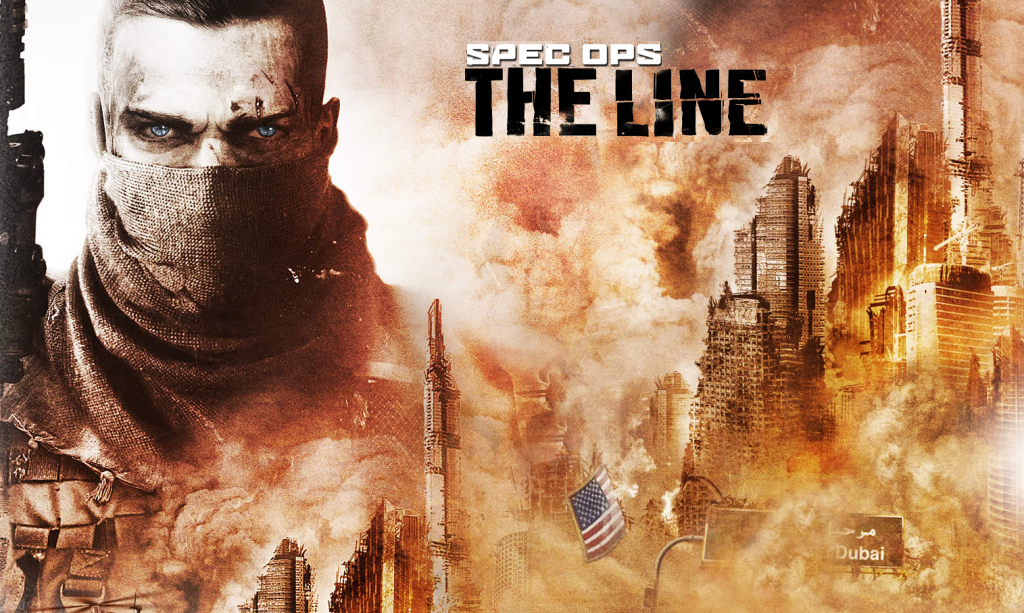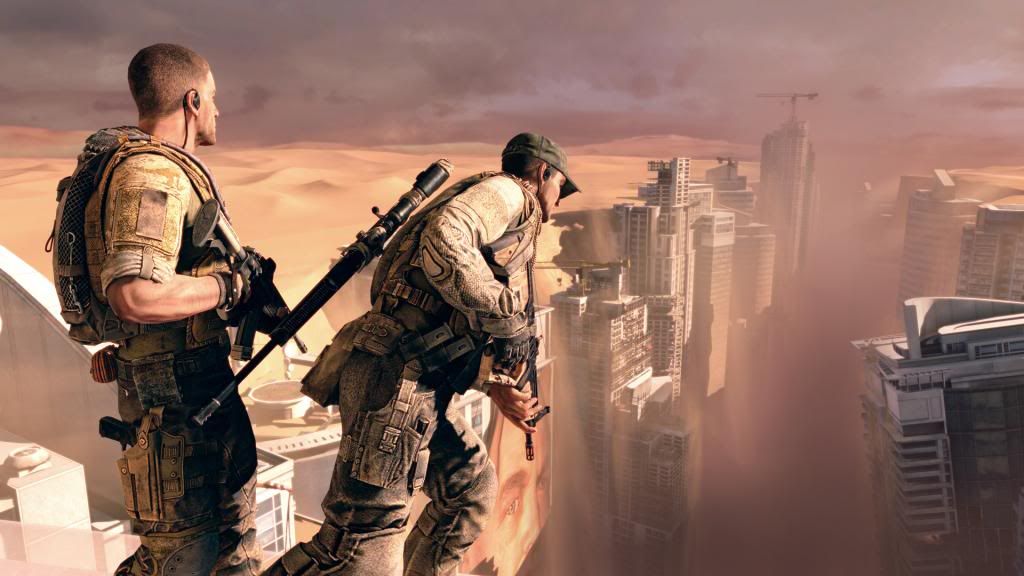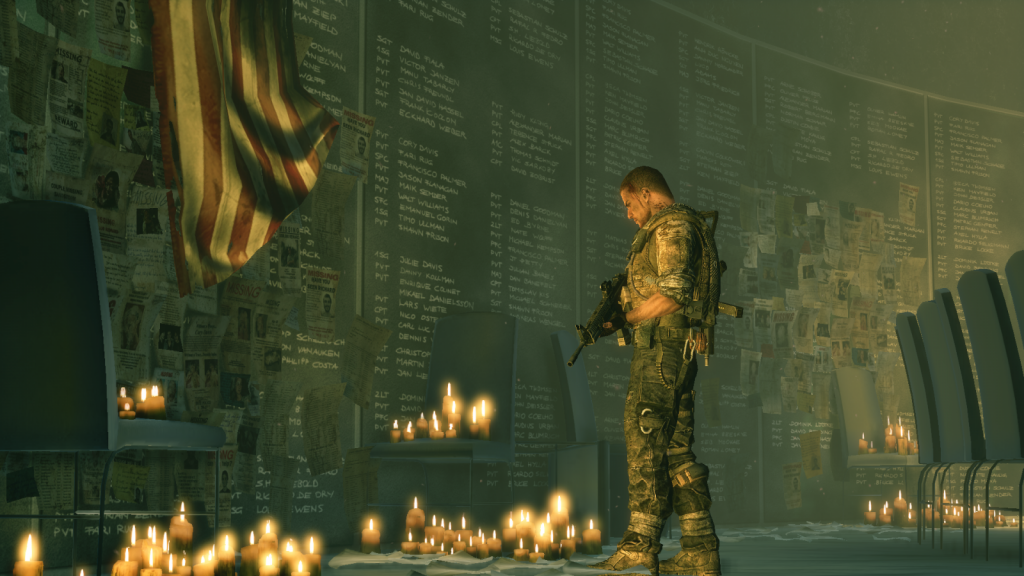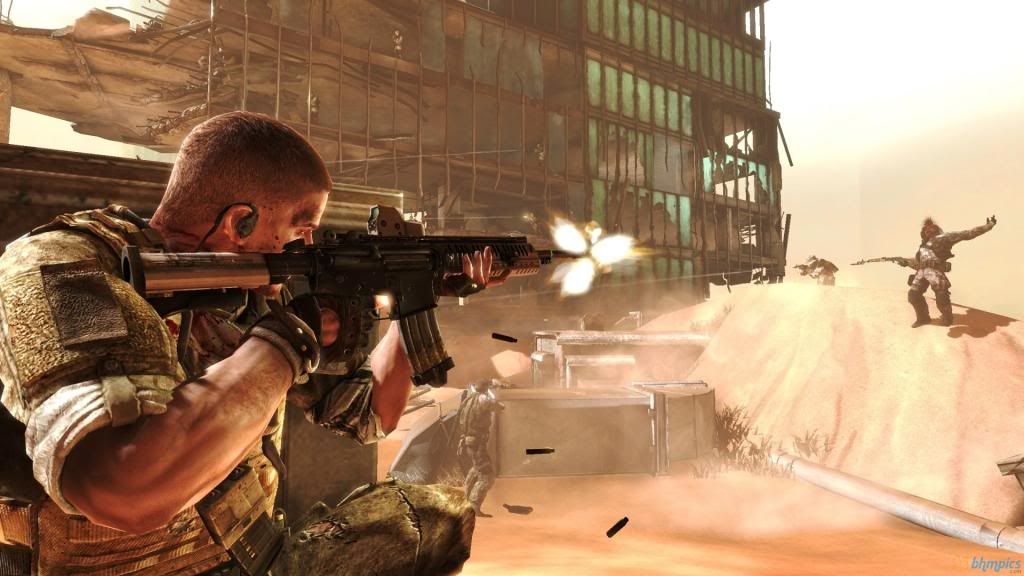If you look up the definition of the word “game”, you will find words like “amusement” and “fun” used to describe it. And video games, by and large, are designed to be just that: fun amusements. But as technology has progressed and the tools used by developers have become more advanced, the capacity for video games to tell stories that give context to the fun continues to grow. And just like with any other medium for storytelling, occasionally a game will come along that eschews the typical through-line of established narratives and try to not only tell a story, but tell us something about ourselves and the world in which we live. Enter Yager Development’s Spec Ops: The Line.

In modern-day Dubai, nearly cataclysmic sandstorms have battered the city. A United States army battalion, the “Damned” 33rd under command of one Colonel Konrad, moved in to help evacuate civilians from the are before it’s swallowed by the desert. After a long silence, a distress signal was detected. Captain Walker of Delta Force and his two squadmates are sent into the area to locate survivors and report back with their status. When they arrive, they find evidence that something has gone wrong within the city. Given his personal history with Konrad, Walker decides to try and find some answers.
The game is a third-person shooter, reminiscent of games like Mass Effect, in which you and two AI partners grab cover where you can and shoot from behind it. Ammunition is scarce in this bleak urban environment devastated by the desert, so you must scavenge what you can from the fallen. There are a variety of weapons, many of which feel somewhat situational, but good luck trying to determine if the P90 or the shotgun is a better choice in the middle of a firefight. The gameplay, while not innovative or a stand-out, is competent and functional, and I am of the opinion that it is the least important aspect of Spec Ops. I will go so far as to say that any review that focused on the gameplay has missed the point of the game entirely.

Much of the scenery is gorgeous in its bleakness.
No, the point of the game is to tell Walker’s story, and as it unfolds, we discover that Walker’s story is one of eroding character, the horrors of war, and perhaps even madness. Rather than constrain this narrative to cut scenes, however, much of the story’s weight and message are in the actions the player can take. Does Walker shoot his foes and move on, or does he take the time to execute them as they lay on the ground, holding their wounds and bleeding out, moaning or gurgling or crying out for mercy? While video game violence is by no means realistic, the executions are somewhat brutal, and they always yield additional ammo – in essence, the game rewards you for being as inhumane as possible to your fellow man.
This is not done with any amount of cheek or humor, though. The actions you take as Walker, or that Walker takes while under your control, are presented strictly as they are, leaving you as the player to make your own judgments as to the necessity of the brutality and the state of Walker’s mind. Walker has multiple opportunities to stop in his pursuit of Konrad and ‘the truth’, ones his squadmates point out as the situation develops, but the more horrors Walker is exposed to, the more dedicated he becomes to finding Konrad. And the further he goes to achieve that goal, the more and more he becomes divorced from the professional solider with whom we’re introduced in the beginning. Say what you like about Nolan North: the transformation in Walker’s words and mannerisms is so potent thanks in no small part to the voice work. The visceral immediacy of modern warfare coupled with Walker’s fanatical pursuit of his quest creates an extremely tight and effective story, albeit not an entirely fun one, and also drives to the heart of a matter beyond the plight of pixelated soldiers.

How many of these candles are lives you’ve taken?
The depiction of modern warfare in video games is one of those things that is often seen or described as glamorized. Some even go so far as to say that such games promote violence. While evidence is threadbare at best when it comes to video games inspiring troubled young people to take up arms, the plethora of games in which heroic soldiers (usually Americans) gun down diabolical foreigners in the name of freedom with attractive and satisfying hardware flood the market and always sell. At first, it seems like Spec Ops is just another one of those paranoid gun-wank fantasy trips, but within the first few minutes the tissue-thin facade of its Modern Warfare and Medal of Honor brethren falls away to reveal a stark reflection of those games and their players. There is one sequence, in particular, where Walker and the player assume your usual perspective on a tool of destruction: from above, in monochrome, on a small military device as you guide projectiles of death. And after all of the explosions and multiple-kill combos and the eagerness of the programmed device, you and Walker must slowly move through the devastation you just caused. I won’t say too much more on the sequence, other than doing so in the way Spec Ops does was a bold choice that makes the glorification of such things in other games seem downright creepy by comparison.
Art, from tragic portraits to satirical plays, has always been in a position to, as Hamlet put it, “to hold as ’twere the mirror up to nature: to show virtue her feature, scorn her own image, and the very age and body of the time his form and pressure.” Spec Ops has the bravery to be unflinching in its depiction of a soldier slowly coming undone due to his own inability to deal with the issues before him in any way but violence, and even extends that towards the player to a degree. This is a game that a player is not entirely guaranteed to enjoy; however, it is also a game that a player is unlikely to ever forget, not because the gameplay is bad or the characters ridiculous, but because it is designed to plunge you into the abyss of the human heart at its darkest, and make you stare at what lurks there whether you want to or not.

Best not to think about that man’s family, right? Do you think they’ll miss him?
I’m skipping the usual “stuff I liked/disliked” portion and going straight to the bottom line, here. There are games that come along that are landmarks in their field. Like Myst for adventure games, StarCraft for real-time strategy, and Silent Hill 2 for horror, Spec Ops: The Line is perhaps one of the most important games I’ve ever played. It breaks from traditional mores of wrapping some spoon-shallow paranoid fantasy around what is essentially the means for online gamers to verbally abuse one another to the staccato background noise of simulated gunfire, and shines a bright and brutal light on the sort of people who enjoy engaging in said abuse. I highly recommend the game for anyone who appreciates storytelling in games, is sickened by modern military shooters, or thinks games are nothing more than passing fancy amusements for the intellectually stunted. It is dark, it is uncompromising, it is chilling, and it is one of the most emotionally fulfilling gaming experiences I have ever had.



Leave a Reply